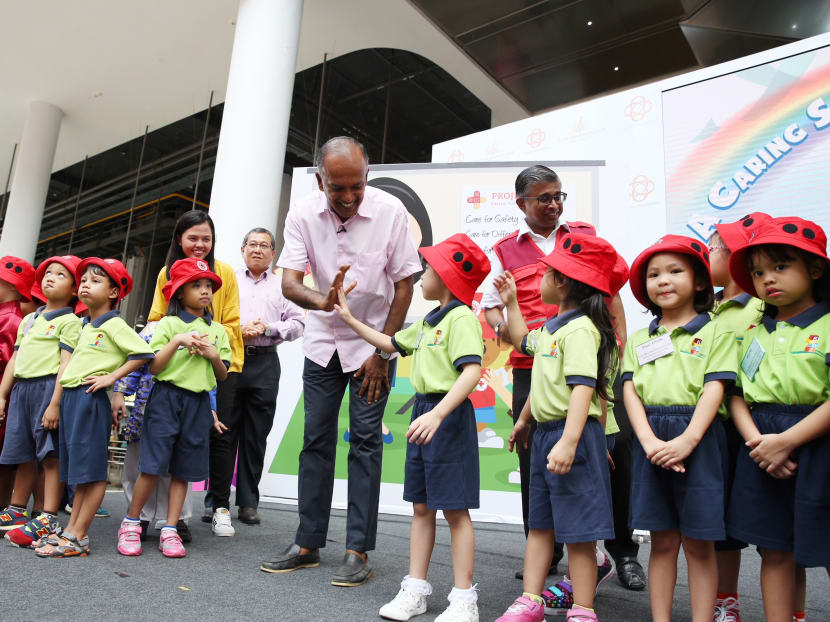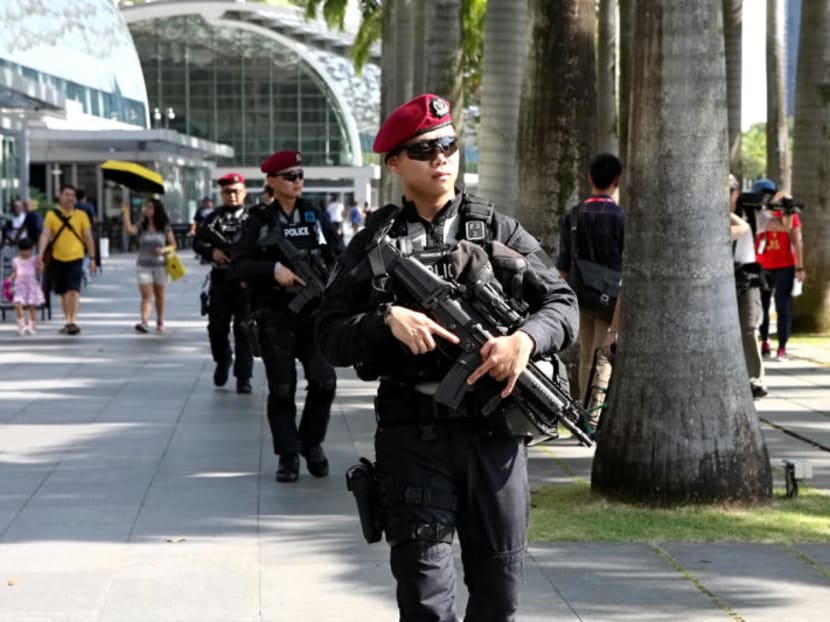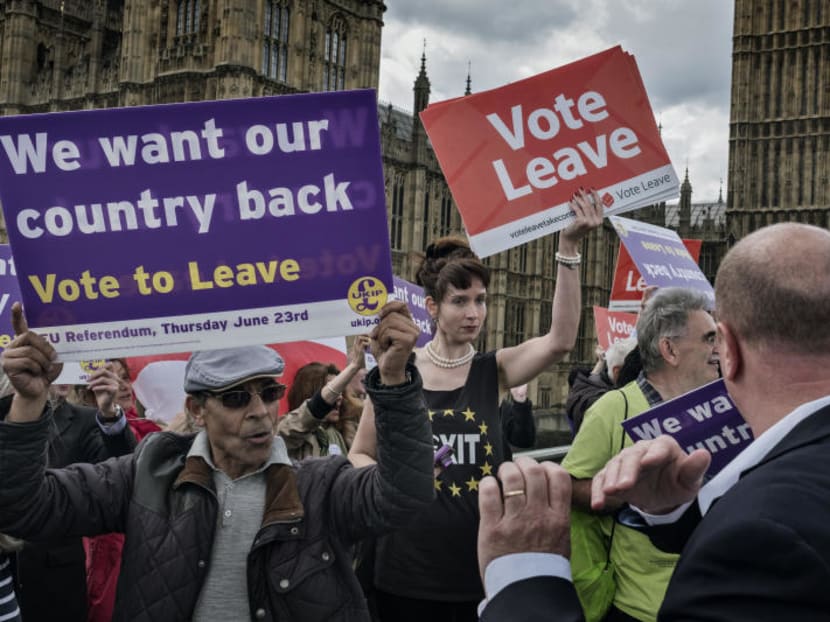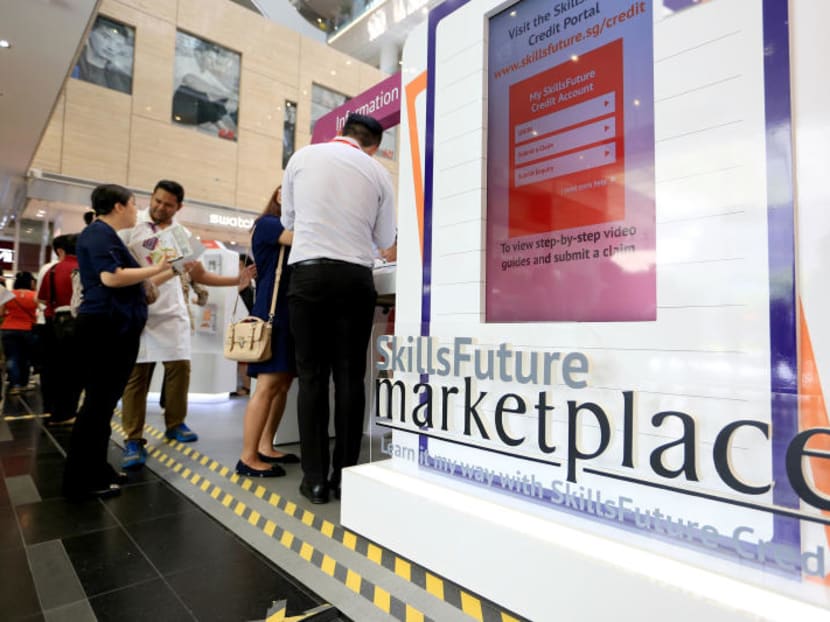Singapore cannot let inequality destroy its social cohesion
Inequality is one of the most serious issues facing Singapore today and if not tackled carefully, will cause society to fracture, said Home Affairs and Law Minister K Shanmugam. While Singapore has done “relatively well” in reducing inequality over the years through “multiple lines of assistance”, more has to be done, he added in a speech on Friday at the launch of a club set up by the Singapore Red Cross and preschool Kidz Meadow for children aged between five and six. Below is Mr Shanmugam’s speech, where he also spoke about the government’s philosophy of giving a helping hand to those who need it, while preserving the ingredients of Singapore’s success – education, hard work, discipline and integrity.

Mr Shanmugam, seen here at the Red Cross Junior Club event on Friday (April 20), says that every organisation and every community in Singapore must come together to help fight inequality.
Inequality is one of the most serious issues facing Singapore today and if not tackled carefully, will cause society to fracture, said Home Affairs and Law Minister K Shanmugam. While Singapore has done “relatively well” in reducing inequality over the years through “multiple lines of assistance”, more has to be done, he added in a speech on Friday at the launch of a club set up by the Singapore Red Cross and preschool Kidz Meadow for children aged between five and six. Below is Mr Shanmugam’s speech, where he also spoke about the government’s philosophy of giving a helping hand to those who need it, while preserving the ingredients of Singapore’s success – education, hard work, discipline and integrity.
I am happy to come for this event to – launch this Red Cross Junior Club and Project C.A.R.E.
This Red Cross Junior is an expansion of the Singapore Red Cross movement for children aged 5 to 6 and really to get our young children to have that humanitarian spirit, teach them to help each other, and care for each other.
And I’m glad to see the partnership that Red Cross Junior has with Kidz Meadow, which is an AMP (Association of Muslim Professionals) outfit, to develop this Project C.A.R.E. as a two-year comprehensive activity-based curriculum.
And it covers 3 areas – care for the elderly, care for the differently abled and care for safety.
Hopefully through the programme, these young kids will recognise differences in people’s physical attributes, they appreciate and care for the elderly, and they can be equipped with life skills, such as First Aid.
It instils in our young people a respect for diversity, empathy, resilience, and hopefully helps lay the foundation for a gracious society that is united, and cares for the less fortunate.
So, I really commend AMP, MERCU, Kidz Meadow, Singapore Red Cross, and their partners, for putting together the curriculum and accompanying Educator’s Guide, and investing effort in guiding the next generation.
This is an important effort.
Now, there is a very powerful symbolism that we often overlooked in this. The Red Cross and AMP, the two started out from two different religions, though now, many of their services are not religion based.
Of course, Red Cross is no longer religion based. And launched by a Minister, who is a practising Hindu. That is a very powerful symbolism in Singapore.
It’s powerful, but it’s also real. And it doesn’t strike us but it is unique.
Why did I agree to come for this programme? Because, there are two levels to it.
One, how it helps our children grow into strong, nurturing individuals. That itself is important, and that is the only thing worth doing.
But there is a second deeper, even more important reason, which is how it empowers our children, give them new experiences, gives them confidence, and in a way, each of these children, will grow up, hopefully, to be empowered and it helps tackle one of the key issues that faces our society today.
And that’s inequality. So, bear with me while I say a few words about inequality.
DANGER OF INEQUALITY
It is one of the most serious issues that we face in addition to ageing and some of the other issues that we have talked about.
I would like to refer to what the Prime Minister had said in Parliament recently.
Mitigating income inequality, ensuring social mobility, enhancing social integration are critical for us.
And I quote him, he says, “If we fail - if widening income inequalities result in a rigid and stratified social system, with each class ignoring the others or pursuing its interests at the expense of others - our politics will turn vicious, our society will fracture and our nation will wither.”
Very strong words. We can’t survive if we don’t deal with this inequality.
And if you want, you look at the effects of inequality in other countries.
In the United States, many of you would have heard of the Rust Belt. People lose their jobs often because of globalisation
Globalisation is good overall – but try telling that to the person who has lost his job.
And the society and the government has got to help the people who have been affected.
Activist economic and social policies are necessary.
But trust is broken – when they who have lost their jobs see that the winners, and the elite seem to be taking most of the benefits – the top 1 per cent or the top 5 per cent - and seem to be controlling the government.

The Singapore public has a high trust in the police and the government, but the trust has to be continuously earned, said the minister. TODAY file photo
We are often told in Singapore – what needs to be done to get trust, and that we have lost trust etc from various people, outside Singapore as well as inside Singapore
And most of their suggestions are based on methods which have been tried in the US, United Kingdom, the West and which have failed or failing.
So, they are too ideological to see that.
We have done well over 50 years by ignoring that sort of advice, and keeping focus on what really matters to people.
What matters to our people?
No corruption – clean government, clean administration.
Jobs.
A government that truly cares for the people, has the people’s interests, works hard for the people, is on the ground, understanding and having strong linkages with the population.
Working hard for the people who need jobs, who do a honest day’s work, to look after their families – thinking ahead to secure the economic future of this country.
Housing matters.
Security matters.
Healthcare matters.
Services, administration in terms of competence matters.
For people to be able to fulfil their aspirations, maximise their potential, in a free and a secure environment.
We have done that and that is why for over 50 years, people have kept their trust.
But it doesn’t mean it will continue. Trust has to be continuously earned.
And for those who suggest that trust in Singapore is broken – they should go and do some homework.
Look at the figures, on trust in the Singapore government, in institutions.
Look at the trust in police – more than 90 per cent confidence. Look at the trust in the Singapore Armed Forces, look at the trust in the civil service, look at trust in the political leadership and then compare it.
You take any western country, it won’t go beyond 30 per cent, mostly. It’s anywhere between 70 to 90 per cent, more than 90 per cent in Singapore. And people tell us trust is broken.
But no room for complacency – trust has to be continuously earned. And it can easily be lost.
Look at the rust belt states. They flipped from Blue to Red. Why?
Among the largest increases in the Republican vote share were in the Rust Belt. They were completely Democratic, they became Republican.
Once known as the Manufacturing Belt, the focus of American industrial development.
But some few decades ago, jobs moved overseas – cheaper, the economy declined. Factories closed. Stores and schools closed. Talent went to other cities. Gulf between the Rust Belt, and the other richer areas – discontent, disaffection, disillusionment.
Growing sense among the people in the Rust Belt that political elites were alienated from the Rust Belt. The people had been left behind, the world had moved on. And so they’re angry.
And you go and preach to them about globalisation, they’re going to say some rude things to you. Because you’re not taking care of them.
We have to take care of the people. That is how you maintain trust. Not by some of these nonsense that we read sometimes.

According to many analysts, inequality was a significant driver of Brexit. Photo: The New York Times
On trust, just as one example, I want to refer to a New York Times articleon the state of the public schools in the US and that’s why these things matter here, like these kindergartens.
It’s only one example of the kind of things that have led to a loss of trust. But this is the way to lose trust.
This New York Times article was on the state of public schools in the US. How poor and how badly run – public schools. Let me give you a few quotes from teachers.
“The antiquated myth of the noble yet poor, teacher must go, I am passionate about my subject and my students. I am not passionate about living paycheck to paycheck.”
Another quote – “My third-grade students are in a mobile classroom, that’s basically a trailer. That’s 25 students in a classroom, the size of a hotel room.
All of the bathrooms are still in the main building. So, my eight and nine-year olds have to walk outside unattended, unless we stop class to take a group bathroom break.
Teachers are being made out to be lazy, incompetent, greedy, but school board members, district administrators, superintendents make the most money, while the rest of us are fighting for crumbs.
I have been ready to strike for over a year. I’m fed up about retiring at the poverty level.”
That’s the state of schools in the richest country in the world. You do that, and you see meanwhile in the Wall Street, people make millions of dollars and then when things go wrong with the banks, they get bailed out.
It had to be done during the great financial crisis, but you can understand people’s anger and the cynicism because the system is seen as looking after the better-off, the well-off. Privatising profit, socialising loss.
It’s a same picture in the UK : Brexit. According to many analysts, inequality was a significant driver of Brexit.
Britain happens to be one of the most unequal societies in the world.
Survey shows the top 10 per cent of households owned nearly half of the country’s total private wealth. And the poorest 1 per cent owned 0.05 per cent of the wealth.
62 per cent of those with household income of more than £20,000 voted to leave the EU.
35 per cent of those whose household income was above £60,000 a year voted to leave.
Country is clearly split along socio-economic fault lines.
So, you can understand, those who wanted to leave are frustrated with the system. They no longer believe in the government or the society or the system.
CHALLENGES OF DEALING WITH INEQUALITY
For us, we have long been aware of the dangers of inequality.
As early as 1961, 57 years ago, the late Dr Goh Keng Swee warned about the risk – that groups of elites might create an environment that would favour one community at the expense of another.
In a Nanyang University journal, 1961, he said and I quote: “In advanced societies, it is not so much open nepotism that is to be feared, but the insidious ‘old boy’ type whereby no illegalities are committed, but in which the pinnacles of power, influence and wealth are the reserve of those born into the right families.
In underdeveloped countries, the matter could be more serious.
A system may arise in which the dominant majority, whether of families, clans or even entire communities, arrogates to itself not only the openings to the seats of power, but also the avenues by which individuals can fit themselves out for such positions of power.
The dominant majority is thus able to point out that those outside of the charmed circle just do not have the necessary qualifications to be admitted to the elite group.
Thus many able and aspiring people are denied the opportunity for the full use of their abilities.”
Very important quote – I often remind myself about this.
We are very small – and if we allow that, our society will fracture, and trust will be completely broken.
So the risks are there. But it does not make it easier to deal with inequality. A small economy has to remain open.
We have to be open to globalisation. And the effects of globalisation are more pronounced in cities.
Because the cities are the epicentre of jobs and trade, where the skilled and unskilled live and work together.
For the skilled and talented, the returns are magnified. But as our country matures, and our economy develops, it’s going to be increasingly challenging to deal with inequality.
But in a small country,the richest in a good class bungalow and the poorest in a rental flat or three-room flat are not more than 15 minutes away. They live 15 minutes away from each other, maximum.
So, inequality, if we allow it to grow, will destroy our social cohesion in the long run.
OUR APPROACH
We have never shied away from what needs to be done, to help the disadvantaged progress upwards in society.
Transfers to lower-income groups (for example Workfare Income Supplements),
Healthcare subsidies, education bursaries, SkillsFuture – where billions are being spent to ensure that Singaporeans continue to upskill,
Substantial housing subsidies – which have helped lower-income families to move from rental flats to modest home ownership, to bigger homes.
These multiple lines of assistance have helped to reduce inequality.
The Gini coefficient in Singapore fell from 0.470 in 2006 to 0.458 in 2016.
You take into account Government taxes and transfers, it falls to 0.402.

Multiple lines of assistance, including SkillsFuture to help Singaporeans upskill, have helped to reduce inequality, says Mr Shanmugam. TODAY file photo
We have also tried to ensure social mobility.
If you look at the 2015 Minstry of Finance study: In the US, among those born to lower-income parents, only 7.5 per cent make it to the top 20 per cent. UK, only 9 per cent. Singapore, 14 per cent.
We have done relatively well. But we have to do more.
We have announced that in the coming years, we will go upstream in providing assistance in the preschool years.
Government will double its annual spending on the preschool sector to S$1.7 billion by 2022.
40,000 more childcare places by 2022, and there will be a total of 50 Ministry of Education kindergartens by 2023.
Why are we focusing upstream? Why am I saying this here at a kindergarten event?
Progress has to be based on ability and talent, rather than class privilege or wealth. This approach has worked for us; principle of meritocracy remains relevant.
But increasingly, the starting points are different.
For those born into families of different backgrounds.
At the point of birth, there is already a gap.
That gap widens because of the differences in the families.
And inequality will manifest itself in many intangible ways: The networks and influence, in the extra developmental opportunities, the more time spent by poorer families in meeting basic needs.
There’s an opportunity cost to this.
Therefore, the preschool years are crucial.
The best chance that Government has to give our children a good start. Government can never substitute what parents can do.
Government can give a good start and a decent chance for the children to succeed and help close the inequality gap.
Our philosophy has got to be: Give a helping hand to those who need it, while preserving the ingredients of Singapore’s success – which is education, hard work, discipline and integrity.
Never take away from Singaporeans’ motivation to do better for themselves, to succeed.
The focus should be on lifting up others, not penalising those who have done well.
Our approach, therefore – keep the overall tax burden low, but use the revenue we have in a fair and progressive way and target the support for the lower- and middle-income group, while keeping government expenditure lean and low.
As the late Mr Lee said, we must ensure that everyone who puts in the effort, runs the race, gets something at the end of it.
But if the same few keep winning – eventually the rest will believe the system is flawed, and they will stop participating.
And we won’t have a society.
So we need to believe that meritocracy actually works. It’s not just a concept.
And our people must believe that based efforts and talent, they can progress, that there is social mobility.
We have to look at inequality. We have to make meritocracy work well. It doesn’t always work well. We must acknowledge that.
Fresh challenges have to be met.
While we dismiss crazy suggestions, you have to be open to all suggestions and analyse them and be open to implementing those that do make sense, even if in the past, you’ve dismissed them.
We always have to make sure that Singapore will always be a country with a fair and just society, equal opportunities for all, where people work hard and achieve their dreams.
It is in this context that your efforts – Red Cross, Mercu, AMP which controls Mercu, Kidz Meadow - are vital because it’s not just Government top down, it has to be organic and community centred as well.
There has got to be multiple points. Every organisation, everyone, every community by coming together can help fight inequality.
Make each one of those children bright, confident, go as far as they’re able to, maximise their aspirations and talent and be good citizens.
One section cannot do well if the rest are not doing at least reasonably well.
We are all in a small boat, the same small boat.









